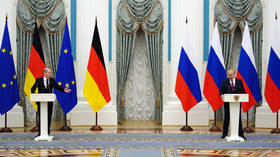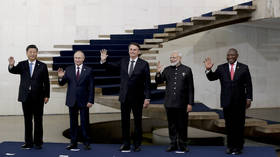Timofey Bordachev: The US is humiliating Germany, and Russians are deeply disappointed at the spinelessness of Berlin’s elites
This ‘divorce’ feels politically motivated and artificial, and one day things will probably change

The German Foreign Ministry has decided to expel about 20 staff members of the Russian Embassy in Berlin. According to media reports, about a third of those employed at the main German mission in Russia - more than 30 people - may leave in the near future. Under these circumstances, the arrival of the new ambassador of the Federal Republic of Germany – the sophisticated politician and diplomat Alexander Graf Lambsdorff – may lose its significance.
In theory, relations in general could be partially frozen, which is exactly what the head of the German Foreign Ministry, Annalena Baerbock, seems to be moving towards. For her, the fight against Russia has become the main thrust of her high office. Russia itself is not particularly upset, but neither is it celebrating this turn of events.
The downgrading of diplomatic relations between Russia and Germany is unlikely to be a tragedy of universal proportions and historical significance for our peoples and states. First of all, any model of interaction between great powers cannot endure as long as they exist only as formally independent actors in international politics.
There is no point in lamenting the fate of the "special relationship" between Russia and Germany. It began in unique historical circumstances and it ends amid a different situation given the circumstances of our time. However, there is no need to worry, because every relationship is a product of the ability of different cultures to come to terms with each other and their basic interests, defined by geopolitical location and resources.
The Russians and Germans seem to be able to get along. During several centuries of close proximity, starting in the middle of the 16th century, we have cooperated quite fruitfully. That said, we are also prone to fighting each other and there have been two violent conflicts in the last hundred years. The first time, the war resulted from the development of a system of European empires that were doomed to clash sooner or later. The second time Moscow had to fight Berlin, when the Germans went collectively insane as a result of their defeat and humiliation in 1918, and with their customary diligence embarked on the most horrific atrocities in human history.
The reluctant switch to competition between Russia and Germany is a result of the present schism is an accidental phenomenon caused by special circumstances. Both know that cooperation is ultimately in their vital interests. This does not mean, however, that the conflict, which is now deepening, will be short-lived; it may well last for a generation. But the two powers are certainly not condemned to perpetual confrontation.
The main feeling in Russian-German relations at the moment is one of disappointment. We are deeply disappointed at how spineless the Germans have proven to be in the face of American influence in European affairs. Much more was expected of Berlin, and the country's economic strength provided a very real basis for those expectations. Now the German authorities have not only destroyed the basis of economic relations with Russia, but are gradually becoming one of Ukraine's most important sponsors.
For its part, Germany is upset that Russia has unwittingly put the final nail in the coffin of Berlin's peaceful dominance over the rest of Western Europe. This was already becoming increasingly problematic with the British withdrawal from the European Union, the strengthening of Poland's political position, and the sabotage of a weakening France all played their part. The US knew it had a golden opportunity to activate all its European resources and drive the Germans into the clutches of full NATO responsibility – from which they had been trying to escape since the end of the Cold War.
In both cases, the fundamental reason for the mutual irritation is the destruction of the ideal picture of the future from the point of view of each of the actors. The question is how long the cooling will last and what changes may occur in the meantime. Few countries in the world are as ideally suited to each other as Russia and Germany, or more precisely the Russian and the German people. In terms of Eurasian geopolitics, these two social communities balance the center of the vast continent, with China and Britain (plus the United States) on the periphery.
Economically, Germany's population and industrial density are ideally suited to Russia's energy exports. Culturally, Russians and Germans are the very opposites that attract. It is no coincidence that so many German natives found themselves in the civil service, cultural life and business worlds of Tsarist Russia.
German moderation is exactly what the boundless Russian nature lacks. And in recent decades it has become commonplace to see a German manager patiently working somewhere in Urengoy. For the Germans, we are those who do not look at them with the arrogance of the French or Anglo-Saxons.
Historically, Russia and Germany are late industrializers, well behind Britain, France, the US and their logistical and financial "hub" in the form of the Benelux countries. That is why the twentieth century was so cruel to both great powers: it consolidated the leadership of the leading capitalist countries and brought the others to the brink of survival. Russia came through it more successfully. Only the empire was lost, but we retained full sovereignty and control over our own territory. Germany was less fortunate and as a result of the events of the last century, it was effectively deprived of the right to determine its own destiny and submitted to the control of the US. Nevertheless, until recently, the German elite were allowed to decide on foreign economic relations, but now even that ‘privilege’ is being taken away.
The general crisis of the world economy and the West's retreat from its position of 500 years of unconditional global domination require it to restructure itself internally. Or, at the very least, force it to search for new formats. Whoever is at the helm of Germany should be well placed to do so, but Chancellor Scholz is a weak leader and his Social Democrats are in one of their worst states as a political force. The other two parties are the Greens and the Liberal Democrats.
According to respected Russian experts on German domestic affairs, the Greens are a collection of exalted moralists for whom the fight against Russia and friendship with the US is a matter of faith. Personally, I find this view difficult to accept. I think that the irresponsibility of Baerbock, for example, is nothing more than the product of pure careerism on the part of a politician who is not backed by any of the conservative groups with clear economic interests. But what the hell, maybe I am wrong, and there really is a place for pure ideology in German politics.
All the more so as the size of the "creative class" that doesn’t produce public goods is also significant in Germany. The Greens' policy is now directed simultaneously against the classical German economic model – with its dependence on Russian energy resources – and against Moscow itself as a symbol of solidarity with the global agenda of the West. The pivot away from Russia and towards the Atlantic is quite decisive, and at the same time the possibilities for self-reliance are diminishing. Just a few days ago, the last nuclear power plant in Germany was ceremonially shut down.
At the same time, the voters of the country are as silent as the people in Alexander Pushkin's tragedy ‘Boris Godunov’. Ordinary German citizens have no desire to get involved in a conflict with Russia, which means that the gap between the elite and the broader population is growing. The emerging form of Germany's relationship with its large eastern neighbour has a distinctly political, artificial character.
In Russia, Germans as such are not universally disliked. Unlike the Poles or the British, for example. So, we cannot say how long the current deterioration in relations will last. But I have no particular doubt that at a new turn in history Russia and Germany will meet again and become friends again.
https://www.rt.com/news/575383-us-is-humiliating-germany/





0 Comments:
Post a Comment
Subscribe to Post Comments [Atom]
<< Home